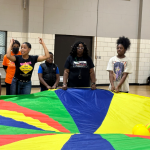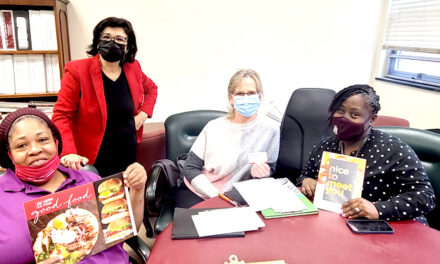In addition to the typical duties of head school administrator, P.D. Jackson-Olin High School Principal Nichole Davis-Williams also keeps one eye on the news, listening for the names of their students. (PROVIDED)
” data-medium-file=”https://www.birminghamtimes.com/wp-content/uploads/2023/12/principal-300×194.jpg” data-large-file=”https://www.birminghamtimes.com/wp-content/uploads/2023/12/principal-1024×662.jpg” />
By Alaina Bookman
AL.com
This is another installment in The Birmingham Times/AL.com/CBS42 joint series, “Beyond the Violence: What Can Be Done to Address Birmingham’s Rising Homicide Rate?”
Nichole Davis-Williams remembers every student who has died from gun violence since she became principal at P.D. Jackson-Olin High School in Birmingham in 2019.
Williams’ days include planning with administrators, meeting with teachers and assessing student achievement. But, unlike many principals, her staff often also have one eye on the news, listening for the names of their students.
In recent months, they have responded to news of students hurt or killed. Since January 2022, three Jackson Olin students have been shot and killed: Kavas Jemison, 16, Caleb Witt, 17, and Jada White, 16.
Birmingham’s homicide crisis affects countless children. Students are left without their friends, teachers left with empty seats in classrooms and parents are left without the sounds of their children running through the halls. In Jefferson County, there have been 175 homicides, including 128 in Birmingham, as of Dec. 19. Last year marked Birmingham’s deadliest year in recent memory, with 142 homicides. Many people killed are children and young adults.
“My administrators and I cringe every day when we watch the news, when we hear murder, shooting, we cringe and we just pray ‘please don’t let it be one of our babies,” Williams said. “We pray that it’s not an aunt, an uncle or a parent of one of our babies. That still affects them, greatly. It affects all of our children, one way or another. Whether we’re releasing them for the day or releasing them to graduate, we just want a safer world out there for them.”
Lost Lives
Jada White was a junior when she was shot and killed on March 29, 2023. Two men were later arrested in connection to the murder.
“Jada was a real sweet girl. She was a cheerleader. She was full of life. She was happy. She was a kid that liked to do stuff. She even joined a high school sorority. She played soccer,” Williams said. “She was promising. She had good grades, wasn’t missing any credits. She had things going for herself.”
The school staff retired White’s soccer ball, cheerleading uniform and sorority jacket after she died. Students and faculty signed the soccer ball before it was put on display in a glass case.
“She had hopes and dreams that she was going to continue to do community service and be involved,” Williams said. “When these things happen it breaks our hearts.”
Kavas Jemison was a sophomore when he was shot and killed on July 23, 2022.
“Kavas was well liked by his friends. He had quite a few friends that he liked to hang out with,” Williams said.
In an interview with AL.com, Jemison’s mother, Akita Jemison, said her son was known throughout their neighborhood – and many others – for cutting grass and walking his dogs.
Kavas took part in the Offender Alumni Association, a non-profit group that began with formerly incarcerated people who wanted to help with re-entry into society. It expanded to include a family support group and Youth Career Readiness Initiative with at-risk youth. Kavas attended the youth program that met on Saturdays and involved mentoring.
Jemison said she wants her son to be remembered as loving and kind.
Caleb Witt was a junior when he was shot and killed March 26, 2023.
Before his death, Witt sat on a plush gray couch in Williams’s office and confided in her that he had a child on the way.
“We talked. He sat there for about three hours talking to me about how he wanted to get things right. He came to my office telling me that he wanted to get on track,” Williams said. “In knowing that he had desires to be ready for this baby, and I was trying to help him reach those goals, that’s what hurt.”
A week before Witt’s death, his mother died. Williams said he spent a lot of time taking care of his mother and making sure he was by her side before her death.
“You never know what they’re going through,” she said.
Investing In Students
Jason Meadows is a member of the Birmingham Board of Education who represents Jackson-Olin High School and George Washington Carver High School. Since January 2022, George Washington Carver has lost students Javarius Reid, 17, and Dwaine Thomas, 17, to gun violence.
Meadows said the school board is investing more in city schools’ social and emotional learning programs. This year, the city has invested $1 million in increasing and improving school mental health supports, as well as funding for credible messenger programs and conflict resolution classes.
Williams said these investments have made a difference in how students communicate with one another.
“We have to give students the tools earlier; social emotional support, conflict resolution, giving young people skills,” Meadows said. “They really just need the skills and the tools to navigate the effects of systemic poverty and oppressive laws and things that have just put them at a disadvantage for years and years.”
Birmingham schools also are trying to incorporate more touchpoints between trustworthy adults and students during the school day. For 15 minutes every morning, teachers talk to students about conflict resolution, how to safely and respectfully navigate social media and tips for working through anger or sadness.
Williams said one of the most important parts of her day is “morning duty,” where she and the teachers greet every student who walks through the door to ask them how they are doing.
Williams has counselors follow up with students who say they are not having a good day to ensure the students feel supported and loved. She also has one on one meetings with the students to give them an opportunity to talk, laugh and decompress throughout the day.
“Every child can hug me, talk to me, they have access to me,” she said. “Because people are hurt, people get hurt. Children aren’t supposed to leave here before us.”
A Success Story
Every Thursday morning, counselors and mentors from the city’s HEAT program come to the school to encourage students to make responsible decisions, treat their peers with respect and stay in school.
“That was the mayor and the superintendent coming together to come up with a solution for some of the violent and negative behaviors for our children to get them back on track socially, emotionally and with their discipline and their attendance,” Williams said.
Williams described one student who frequently got into trouble before starting the HEAT program.
“Since she’s been going to HEAT, she keeps coming to my office, she wants to talk, she’s been on top of her work, she joined the band. She’s helpful to her classmates. She’s taken a leadership role in the school after being in HEAT. Something’s happening there. It’s turning people around. She’s a success story,” Williams said.
Job Fair For Parents
Jackson-Olin faculty members have hosted resume workshops and job fairs for parents. There is a “parents’ corner” in the front office offering resources and a room dedicated to parents to use the computers and printers. Williams said the goal is to reach the students by reaching the parents.
She said she often thinks about other ways to improve students’ lives outside of school. Williams has wondered if there’s a way to purchase some of the homes and land in Ensley to rebuild them and provide safer living conditions for the neighborhood’s residents.
“A lot of times these students’ attitudes start with their living conditions. If you look around you on your way in and out, you’ll see a lot of homes with roofs that are caved in or the homes are literally falling apart but they don’t have the means to repair them,” she said. “We don’t know what these children are dealing with before they get to us.”
Daniel Marullo, a pediatric psychologist and neuropsychologist with Children’s of Alabama, said many people who live in areas with high rates of violence, like Birmingham’s west precinct, or know someone who has been shot and killed, are at risk of secondary victimization.
“Kids are at higher risk if they’re closer to the event,” he said.
“Okay To Talk”
Students who have lost a friend to gun violence may feel depressed, irritable, anxious or paranoid. They may have sudden outbursts, struggle to pay attention in class or isolate themselves from their friends.
Marullo said it is important to give children the time and space they need to grieve in a healthy way to acknowledge that something traumatic happened.
“Part of that is just making it okay to talk about things.”
With the rise in homicides throughout the city, both Meadows and Williams said they believe adults need to step up to be examples for the children in their lives.
“These young people, they need people to believe in them and to show them a different way to avoid these perilous outcomes,” Meadows said. “I lost people that were very close to me, even within the past year. I am the community. These are my friends. These are my relatives. They’re my best friends, family. It’s my church member. So I think there are no knights in shining armor coming to save our communities. We are the cavalry.”
“I have seen some students’ families move out and potentially go to different school districts because of the violence. I wish they wouldn’t because this is our home, this is our community. We make it what it is. I really wish we could prevent others from leaving and reclaim what we have,” Williams said. “We need to listen to these kids, try to be there for them, try to help them out. It all comes back to the community.”
Alaina Bookman’s violence prevention coverage and the “Beyond the Violence” series is supported through grants and donations. Contribute here.











